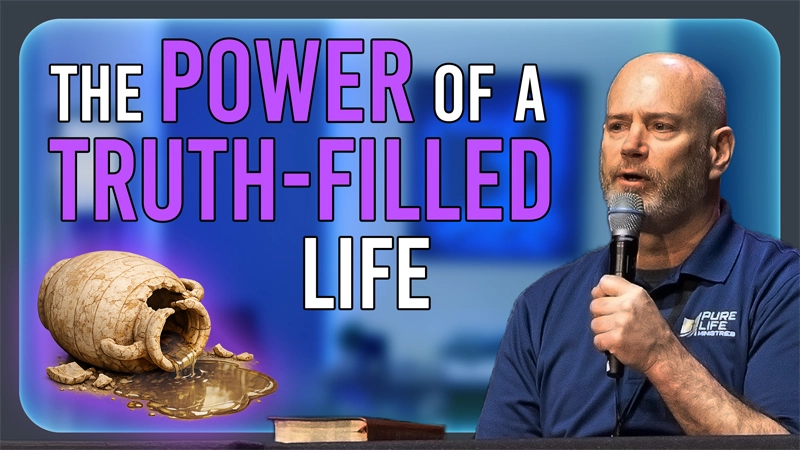
The Searing of the Christian Conscience
Most people think of hardened criminals and the most duplicitous of men when speaking of someone with a seared conscience. Yet, I believe many in the Church today are also in very real danger of this spiritual phenomenon.
The apostle Paul had a clear understanding of the damaging effects of sin on the human heart. He spoke insightfully of those who were “seared in their own conscience as with a branding iron” (1 Timothy 4:2), and those who “because of the hardness of their heart (have) become callous.” (Ephesians 4:18-19) Both metaphors—the seared conscience and the hardened, calloused heart—describe the same condition.
The Need for the Conscience
What is the human conscience? According to Vine’s Dictionary, the Greek word for conscience (suneidesis) literally means to possess “co-knowledge” of something resulting in one’s “sense of guiltiness before God.” Thus, we were created with a unique and intrinsic faculty that gives us a kind of third-person perspective on the rightness and wrongness of our actions.
According to A.W. Tozer, the foundation of the human conscience is “the secret presence of Christ in the world.” To support his conclusions, he points to John 1:9, “There was the true Light which, coming into the world, enlightens every man.” This inward moral awareness is simply the “secret inner voice” of the Lord “accusing or else excusing him.”(1) Tozer very well may be right.
In the physical realm, the conscience is comparable to the human nervous system. When a person is wounded, he feels pain—the body’s inherent means of alerting him that something is wrong. Likewise, when a person sins, the human soul has a warning system that sounds an alarm because the person’s actions have wounded him spiritually. This soul-alarm trumpets, “Mayday! Mayday! Something is wrong!” He senses that his actions are not only wrong but will also result in destructive consequences.
A Tender Conscience
A person with a tender conscience is keenly aware of every infraction against the Lord. He recognizes sin for the ugly thing that it is. Immoral deeds, though seemingly insignificant to others, are viewed by him as monstrous crimes against a holy God. Their importance, while not exaggerated, is internally magnified so that their true, insidious nature may be clearly seen.
The person with a soft heart also remains consistently open to the Holy Spirit’s conviction. He is not looking to push the limits of sin—to see how much he can get away with—but to avoid it altogether. Sin, to him, is a poison which must be eradicated at any cost. The prayer of David expresses the unseen attitude of such a person: “Search me, O God, and know my heart; try me and know my anxious thoughts; and see if there be any hurtful way in me, and lead me in the everlasting way.” (Psalm 139:24)
Most people who have experienced a true conversion begin their new life with this kind of spiritual sensitivity. The “eyes of their hearts” have been opened to the wonders of Jesus Christ and His kingdom. Concern over the prospect of doing something against their Savior can actually drive them to run to their pastor over things that seem ridiculous to more seasoned saints.
{{blog-rotating="/blog-ads-storage"}}
A Wandering Conscience
Unfortunately, it is often only a matter of time before the “first love” for Jesus dwindles into religious form. As new converts begin to “learn the ropes” of Christianity, a slight hardening of the heart takes place. The deep sense of helplessness that once created such a humble dependence upon the Lord is gradually replaced with spiritual pride. Bright and innocent faith is slowly supplanted by cynicism. Eventually, the world’s attractions regain their carnal luster, old idols are re-erected within the heart, and once-forsaken sins start to resurface.
The Bible describes this process as the “wandering away from” a “good conscience,” (I Timothy 1:5-6) and the corrupting of the conscience (Titus 1:15). Both describe the same process of inner moral decay that occurs when a person allows sin to re-establish itself within their heart. If the person continues along this course, he will soon lose the sense of the evil nature of sin. A perfect illustration of this truth is the way a nonsmoker can become accustomed to the smokiest room—once he has taken up the cigarette habit himself. Clean lungs detect every whiff of pollution; dirty lungs have lost that capability.
The person who habitually gives himself over to sin loses the ability to feel the spiritual “pain” of sin. What happens to people who lose this sense? Consider lepers who experience a similar thing physically. Having lost sensation in their extremities, they are often terribly hurt and can even die because they are unaware of a bodily injury. In the spiritual realm, this is a picture of the hardening that takes place inside a person who remains in unrepentant sin. As his heart becomes increasingly calloused, the spiritual system God constructed within him slowly loses its ability to detect the damage being done to it. It’s little wonder that Christian men in habitual sexual sin can sit in church week after week, singing songs of worship to a God they continually defy. “Hardened by the deceitfulness of sin,” (Hebrews 3:13) their entire beings are riddled with a leprosy of evil which they can no longer even detect!
In such cases, as their conscience undergoes a constant searing, these men are gradually desensitized to the guilt of sin. If left unabated, this process will eventually lead to the death of conscience. As one writer stated it, “Such men must have won that most disastrous of victories — the victory over conscience.”(2)
A Seared Conscience
What does it mean to have one’s conscience seared? To answer that question, I consulted the godly writers of yesteryear. Adam Clarke described it thus: “One cauterized by repeated applications of sin, and resistings of the Holy Ghost...”(3) The Fausett Bible Dictionary explained it as, “…a hardened determination to resist every spiritual impression…”(4) The Pulpit Commentary said it is “the gradual deterioration of sensibility produced by (habitual sin).”(5) John Wesley likened it to, “drunkenness of soul, a fatal numbness of spirit…”(6)
In summation, if a person remains in sin long enough, he can reach a point where he is no longer influenced by the Holy Spirit. He has become so hardened that he will not listen—does not want to hear. I believe this phenomenon is that which the Bible terms apostasy.
How can a man know if he has gone too far? The very concern over such a possibility reveals the fact that there remains hope for him. Apostates, having lost all sense of morality, have no concern over such matters.
A Renewed Conscience
However, when a man in habitual sin repents—by acknowledging his guilt and taking steps to put it behind him—his hardened heart begins to soften, and he gradually begins to feel the conviction of sin once again. Finally, he is back in the place where God can reach him and help him overcome. As the writer of Hebrews exclaimed, “how much more will the blood of Christ... cleanse your conscience from dead works to serve the living God?” (Hebrews 9:14)
Nobody enjoys the feeling of guilt over wrongdoing. However, the alternative is to have no feeling: no Holy Ghost conviction, no discernment of right from wrong, and no sense of shame over the evil nature of sin. The human conscience truly is a gift from God. Personally, I plan on treasuring this gift by maintaining a soft heart and a ready ear for the convicting voice of the Holy Spirit.
(1) A. W. Tozer, The Ground of Human Conscience: Christ’s Presence in the World from the book Echoes of Eden, copyright 1994. Used by permission of Christian Publications.
(2) H. Melvill, The Biblical Illustrator, Isaiah 1, Ages Software.
(3) Adam Clarke, Hebrews 13, ibid.
(4) Fauset’s Bible Dictionary, Blasphemy, ibid.
(5) Pulpit Commentary, 2 Samuel 18, ibid.
(6) The Works of Wesley, Vol. 5, ibid.
















